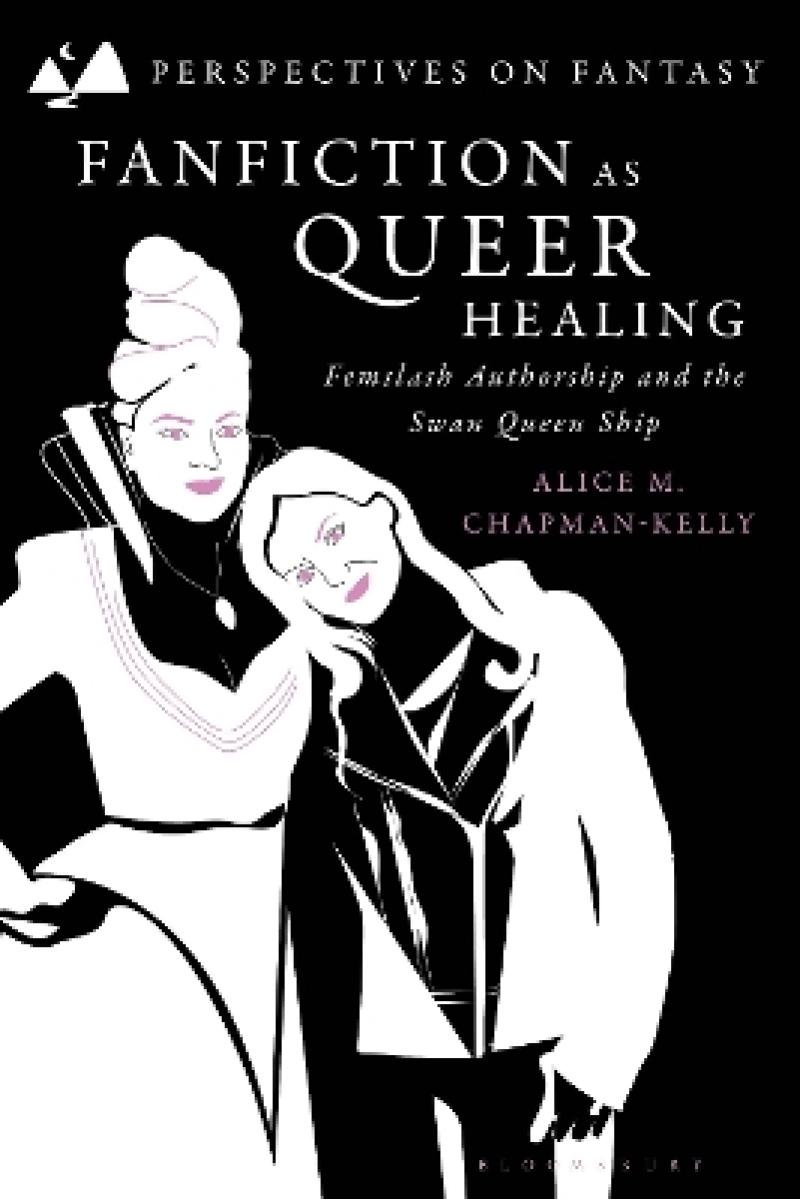Exploring the phenomenon of Femslash fanfiction (fan narratives that bring together heterosexual female characters from mainstream media and fiction), this book analyses fan-authored works as forms of literature worthy of studying at length. It examines the anti-racist, feminist, sapphic fan works produced in response to white supremacist, heteronormative, queerbaiting mainstream fantasy and argues that they represent a significant site of queer healing for marginalised audience members.
Focusing on the 'Swan Queen' fandom, where fans pair the ‘white trash’ heroine, Emma Swan and the villainous Latina Evil Queen (Regina Mills) from ABC's hit show Once Upon a Time, Alice Kelly redresses the widespread academic neglect of queer female fandoms and responds to urgent calls to diversify fan and fantasy scholarship. With reference to complex theoretical subjects such as ethnography, sociology, psychology and decolonial, queer, film and media studies, the book also delves into the alternative timescales on which queer female and genderqueer fan authorship runs; offers intriguing insights into fanfiction narrative structures; and tackles the issues of broader fandom representation and contextualization.
Making the case that fan texts deserve attention in the academy, Kelly shows how some of the most prolific fan works have the ability to enact colour reparation and a reclamation of memory, fantasy, romance, maternity, childhood, parenting and magic. These fictions serve fan communities as a whole through intersectional challenges to the power dynamics of the source text and within the fandom itself and, as the book demonstrates, offer attendant validation to fantasy fans who have been repeatedly told that the genre is not for them.
Introduction: ‘We wrote them fairytales, and we wrote ourselves fairytales’
Part 1: Queering genre
1. ‘“Season One … Episode One”’:
Remembering femslash fandom in coalitiongirl’s Send Up a Signal (that everything’s fine) (2015c)
2. ‘“always the cure”’:
Reclaiming darkness in lostlilsnail’s Striking Down Roots (2018a)
3. ‘over and over and over again’:
Rescripting romance in deemn’s Cops & Robbers (2014c)
Part 2: Queering family
4. ‘lungs and blood and foolish heart all yearning’:
Embodied non-biological maternity in everdeen’s i’ve tried to resist being last on your list (2016)
5. ‘“Welcome home, querida”’:
Children’s books, belonging and being enough in amycarey’s Down the Rabbit Hole (2014)
6. ‘A small body held against her chest’:
Parenting pasts and futures in gingerandhoney’s When you think all is lost, look again (2015)
Part 3: Queering magic
7. ‘encuentre a la que deje atrás’ (‘find the one I left behind’):
Finding home and re-enchanting community in DiazTuna’s In the Night (2019b) and In the Day (2020b)
Epilogue: ‘passing stillness’
References
Index
The first book-length exploration of femflash fanfiction and its implications for wider fan communities, this text presents new theories of queer, fan, and fantasy time based on fan-authored works inspired by characters from ABC's Once Upon a Time.
The first academic series with an exclusive critical focus on Fantasy, Perspectives on Fantasy publishes cutting-edge research on literature and culture that brings sophisticated discussion to a broad community of debate, including scholars, students, and non-specialists.
Inspired by Fantasy's deep cultural roots, powerful aesthetic potential, and reach across a broad range of media – from literature, film and television to art, animation and gaming – Perspectives on Fantasy provides a forum for theorising and historicising Fantasy via rigorous and original critical and theoretical approaches. Works in the series will cover major creators, significant works, key modes and forms, histories and traditions, the genre’s particular affordances, and the ways in which Fantasy’s resources have been drawn on, expanded and reconfigured by authors, readers, viewers, directors, designers, players, and artists. With a deliberately broad scope, the series aims to publish dynamic studies that embrace Fantasy as a global, diverse, and inclusive phenomenon while also addressing oversights and exclusions. Along with canonical Anglophone authors and texts, the series will provide a space to address Fantasy creators and works rooted in African, Asian, South American, Middle Eastern, and indigenous cultures, as well as translations and transnational mediations.
Topics may include (but are not restricted to) examinations of world-building, the development of narrative conventions, the operation of magic systems, the construction of evil, the (re)negotiation of myths and histories, and creators’ engagements with ethical, social, and ecological issues. The series will be alive to Fantasy’s flourishing fan cultures, studying how audiences engage critically and affectively and considering the ease with which participants in Fantasy communities move from being readers and watchers to players, writers, and artists.
